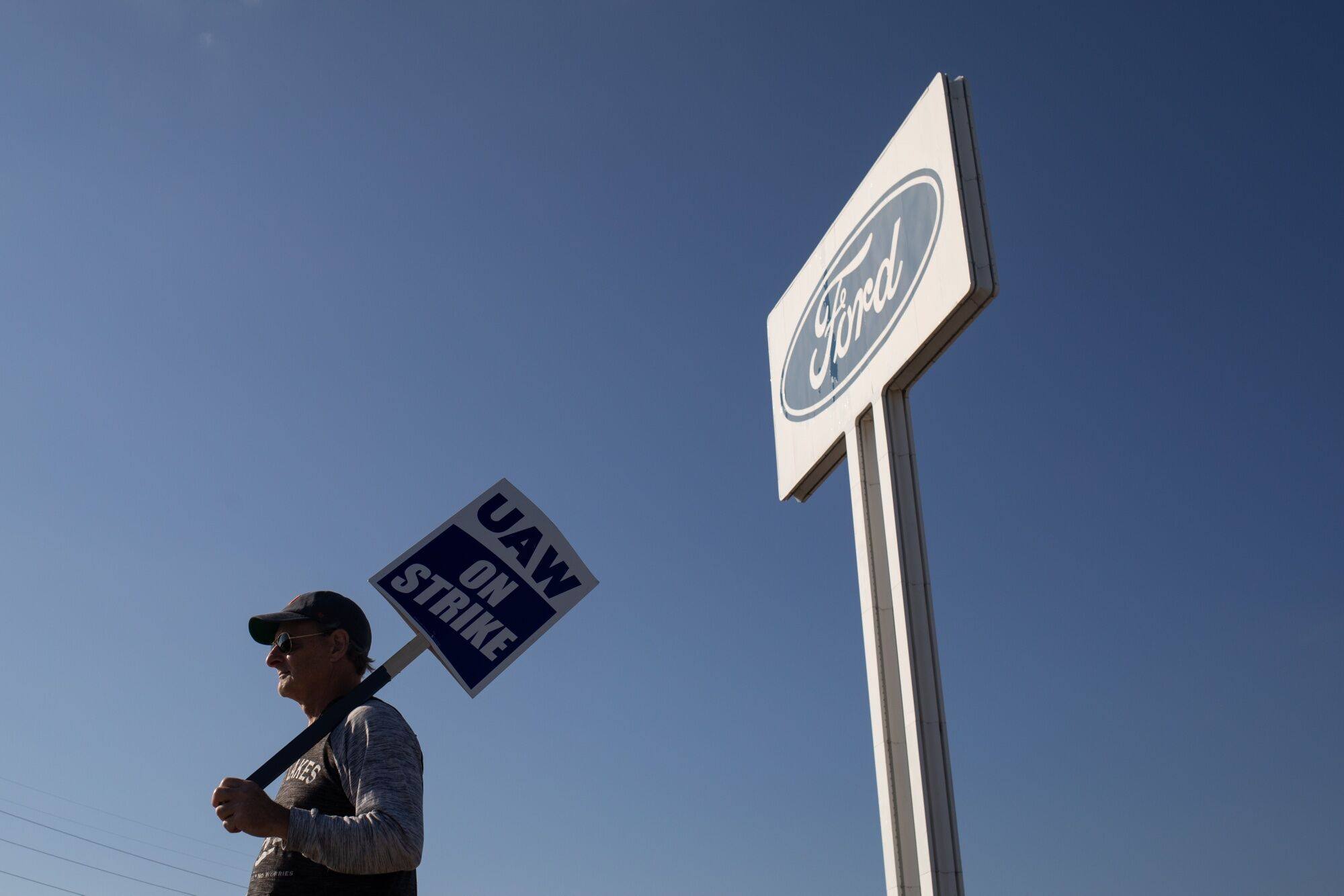US historic strike at 3 Detroit car makers could change future of car making in America

[ad_1]
About 13,000 US car workers stopped making vehicles and went on strike Friday after their leaders could not bridge a giant gap between union demands in contract talks and what Detroit’s three carmakers are willing to pay.
Members of the United Auto Workers union began picketing at a General Motors assembly plant in Wentzville, Missouri; a Ford factory in Wayne, Michigan, near Detroit; and a Stellantis Jeep plant in Toledo, Ohio.
It was the first time in the union’s 88-year history that it walked out on all three companies simultaneously as four-year contracts expired at 11.59pm on Thursday.
The strikes are likely to affect the future of the union and of America’s home-grown car industry at a time when US labour is flexing its might and the companies face a historic transition from building internal combustion engines to making electric vehicles.
If they last a long time, dealers could run short of vehicles and prices could rise, impacting a US economy already under strain from elevated inflation. The walkout could even be a factor in next year’s presidential election by testing Joe Biden’s proud claim to be the most union-friendly president in American history.
“Workers all over the world are watching this,” said Liz Shuler, president of the AFL-CIO, a federation of 60 unions with 12.5 million members.
Chinese electric car battery maker CATL targeted in US bill blocking tax credits
Chinese electric car battery maker CATL targeted in US bill blocking tax credits
The strike is far different from those during previous UAW negotiations. Instead of going after one company, the union, led by its pugnacious new president, Shawn Fain, is striking at all three.
But not all of the 146,000 UAW members at company plants are walking picket lines, at least not yet.
Instead, the UAW targeted a handful of factories to prod company negotiators to raise their offers, which were far lower than union demands of 36 per cent wage increases over four years.
GM and Ford offered 20 per cent and Stellantis, formerly Fiat Chrysler, offered 17.5 per cent.
The limited strikes will help to preserve the union’s US$825 million strike fund, which would run dry in about 11 weeks if all workers walked out. But Fain said more plants could be added if the companies don’t make better offers.
Even Fain has called the union’s demands audacious, but he maintains the carmakers are raking in billions and can afford them. He scoffed at company statements that costly settlements would force them to raise vehicle prices, saying labour accounts for only 4 per cent to 5 per cent of vehicle costs.
“They could double our raises and not raise car prices and still make millions of dollars in profits”, Fain said. “We’re not the problem. Corporate greed is the problem”.

The strikes capped a day of both sides griping that the other had not budged enough from their initial positions.
In addition to general wage increases, the union is seeking restoration of cost-of-living pay rises, an end to varying tiers of wages for factory jobs, a 32-hour week with 40 hours of pay, the restoration of traditional defined-benefit pensions for new hires who now receive only 401(k)-style retirement plans, pension increases for retirees and other items.
Top-scale assembly plant workers make about US$32 per hour, plus large annual profit-sharing checks. Ford said average annual pay including overtime and bonuses was US$78,000 last year.
The Ford plant that’s on strike employs about 3,300 workers, and it makes Bronco SUVs and Ranger midsize pickup trucks. The Toledo Jeep complex has about 5,800 workers and manufactures the Jeep Wrangler SUV and Gladiator pickup. GM’s Wentzville plant has about 3,600 workers and makes the GMC Canyon and Chevrolet Colorado midsize pickups, as well as the GMC Savana and Chevrolet Express full-size vans.
[ad_2]
Source link





